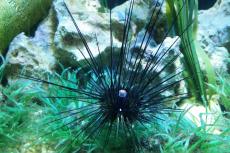More and more divers are meeting sharks for the first time, and wondering, “What do they see when they pass, gazing at us gazing at them?”
Contributed by
Sharks have a very different set of senses than we do, yet the eye-sight of the free swimming species is good, so when they look at you, they are seeing you. But you may have the impression that they are using senses other than their eyes most often, and indeed, apart from our shared good eye-sight, it is impossible for us to imagine how sharks experience their liquid realm.
Sound and vibration are very important to sharks. Sound travels a long way in water, spreading in a uniform spherical pattern, and sharks hear well. They are particularly sensitive to low-frequency vibrations, such as those caused by movement in the water and crashing waves. They can also detect pressure waves with the sense organ called the lateral line.
The lateral line is found in fish, sharks, and some amphibians, and is made up of a series of receptors in a line along the length of the animal. The receptors consist of a sensor within a cupola of jelly, which is directly affected by pressure in the water, just as the hair cells in our inner ears, which keep us balanced, are directly affected by movement. It is thought that the lateral line and the inner ear have a common origin far back in evolutionary time when life was selecting the basics.
A complex nervous system analyses the incoming information in each tiny receptor, enabling sharks to perceive events beyond visual range through these pressure vibrations.
Sharks can be aware of a person or large animal moving in the vicinity, while remaining unseen, beyond the blue curtain of the visible range. Some of the sharks present at a shark feeding dive may have come to investigate, after hearing the submarine uproar caused by other sharks feeding. On their first approaches into visible range, you will see that these late comers generally pass just barely into view. A few minutes later, they will come again, probably closer.
Then there are the electro-receptive organs, the ampullae of Lorenzini. They detect voltage―electrical potential across a barrier. This is not the same as the ability to detect current flowing through a conductor, such as along a nerve—sharks cannot detect brain waves. But they can hear the beating of your heart, and sense other signals about your subjective state.
The ampullae of Lorenzini can pick up the voltage emitted by working muscle tissue. Sharks easily detect such voltage down to the microvolt range, which is the range emitted by most sharks’ prey. Since sea water is saltier than blood, the difference in ionic concentration produces an electrical potential between the inside and the outside of fish. The animal’s skin shields most of it, but there are places, such as the gills, that emit a faint electric field that sharks can detect.
It has been calculated that in a perfect ocean, a typical shark could detect a one-and-a-half-volt AA battery from a distance of hundreds of kilometres, but the ocean is full of background noise that limits the range to about a metre. So sharks and rays use their electro-sense to detect living prey at close range. This works even when the prey is hidden in murky water or when it is buried in sand.
Lastly, a shark can taste and feel its prey with its sensitive mouth, which is the only part of its anatomy designed by nature for contact with the solid environment.
All of these senses are used in different combinations, depending on species and circumstance, just as we at times use hearing more than sight, and at other times are focused on an odour or touch. The more than four hundred seventy species of sharks, diversified across eight orders, inhabit a wide variety of environmental niches, so their senses are adapted accordingly, and doubtless vary widely, just as bird species adapted to different habitats are very different from each other.
Sharks are aware of a very different reality than we are, yet underwater they appear as peaceful and very rational animals as they pass, looking at divers looking at them. It is possible that they can sense whether you are stressed or frightened, or completely relaxed, which could indicate to them that you are not in attack mode. Shy sharks will avoid you most when you are purposely finning and looking for them, for example, and if you want one to approach, stay very quiet in the water, and maybe it will come closer for a look.
The majesty of being in the presence of a shark is unforgettable, and shark dives present one of the best ways to discover them.
(c) Ila France Porcher


























